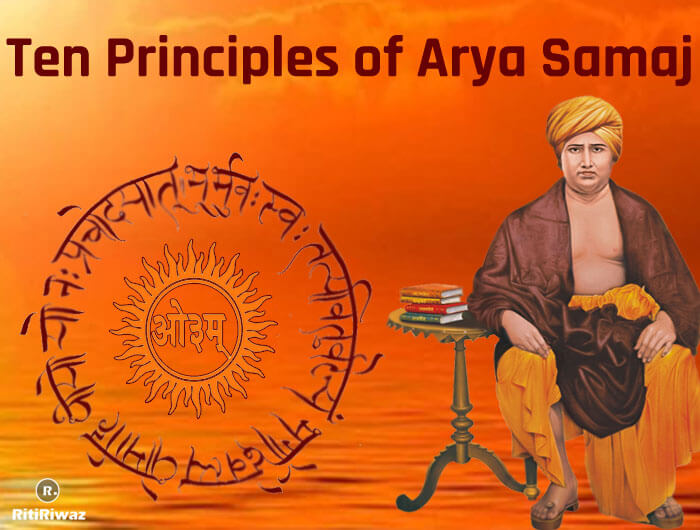Ten Principles of Arya Samaj

On 7 April, 1875 Dayanand Saraswati formed the Arya Samaj at Bombay on the day of Gudi Padwa. It was a Hindu reforms movement, meaning “society of the nobles”.
The purpose of the Samaj was to move the Hindu religion away from fictitious beliefs. The main religion of the Arya Samaj was human religion. He described philanthropy, human service, karma, and knowledge as the main basis whose purpose was mental, physical, and social progress. ‘Krinvan to Vishvam Aryam” was the motto of the Samaj, which means, “Make this world noble”.
Arya Samaj believes in one God and rejects the worship of Idols. Many opposed Swamiji, but no one could stand before his logical knowledge. Great scholars, pandits had to bow before Swamiji. Similarly, in the darkness of superstition, the feeling of Vedic light was beginning to be felt by everyone. The 10 principles of Arya Samaj are quite distinct from Hinduism, yet based on the Vedas.
The ten principles of the Arya Samaj
1. God is the efficient cause of all true (satya) knowledge and all that is known through knowledge.
2. God is existent, intelligent, and blissful. He is formless, omniscient, just, merciful, unborn, endless, unchangeable, beginning-less, unequaled, the support of all, the master of all, omnipresent, immanent, unaging, immortal, fearless, eternal and holy, and the maker of all. He alone is worthy of being worshiped.
3. The Vedas are the scriptures of all true (satya) knowledge. It is the paramount duty of all Aryas to read them, teach them, recite them, and hear them being read.
4. One should always be ready to accept the truth (satya) and to renounce untruth.
5. All acts should be performed in accordance with Dharma that is, after deliberating what is right and wrong.
6. The prime object of the Arya Samaj is to do good to the world, that is, to promote the physical, spiritual, and social good of everyone.
7. Our conduct towards all should be guided by love, righteousness, and justice.
8. We should dispel Avidya (ignorance) and promote Vidya (knowledge).
9. No one should be content with promoting his/her good only; on the contrary, one should look for his/her good in promoting the good of all.
10. One should regard oneself under restriction to follow the rules of society calculated to promote the well-being of all, while in following the rules of individual welfare all should be free.
These 10 founding principles of the Arya Samaj were the pillar on which Maharishi Dayanand sought to reform India and asked people to go back to the Vedas and its undiluted spiritual teaching. Arya Samaj directs its members to condemn ritualistic practices like idol worship, pilgrimage, bathing in holy rivers, animal sacrifice, offering in temples, sponsoring priesthood, etc. The Samaj also encouraged followers to question existing beliefs and rituals instead of blindly following them.
The Arya Samaj not only sought spiritual reorganization of the Indian psyche but also worked towards abolishing various social issues. Primary among these were widow remarriage and women’s education. The Samaj launched programs to support widow remarriage in the 1880s. Maharishi Dayanand also underlined the importance of educating the girl child and opposed child marriage. He proclaimed that an educated man needs an educated wife for the overall benefit of society.






